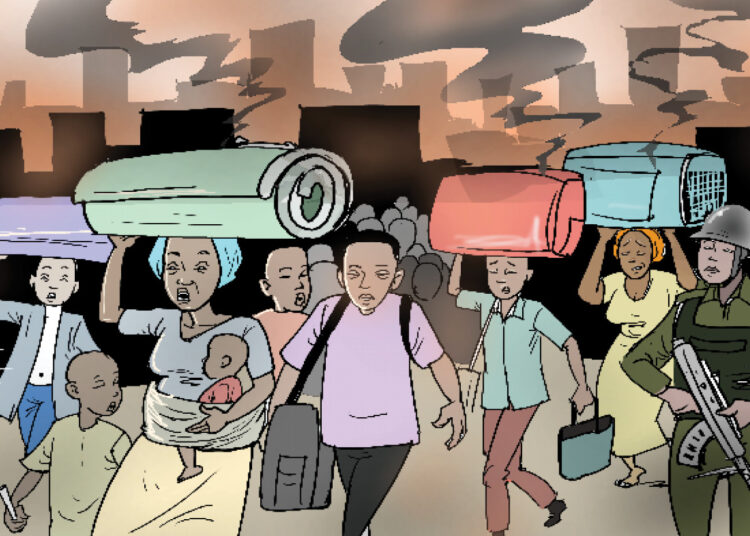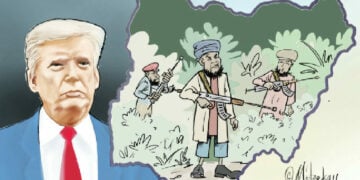Once again, the Democratic Republic of Congo (DRC) is in flames. Towns are razed, bodies pile up in hospital morgues, and terrified civilians mostly women and children flee for their lives. The resurgence of the March 23 Movement (M23) rebels in the eastern regions of the country has reignited a crisis that has been simmering for decades. Yet, despite the horror unfolding, the world remains largely indifferent.
The capture of Goma, a strategic city of two million people, by M23 rebels in January 2025 has plunged the region into chaos. Reports of mass killings, sexual violence, and the displacement of hundreds of thousands paint a grim picture. The humanitarian catastrophe is undeniable, yet global attention remains fixated elsewhere—on the wars in Ukraine and Gaza, on the outcome of the elections in the United States and the ensuing trade wars, and the latest technological breakthroughs in AI.
While the Congolese government accuses Rwanda of backing the rebels, Western nations, many of whom rely on Rwanda for strategic mineral resources, remain hesitant to act. Even as the European Union faces mounting pressure to suspend its mineral agreement with Rwanda, economic interests seem to outweigh moral responsibility.
The silence of the international community is deafening. The world mobilized for Ukraine within days of Russia’s invasion. In Gaza, global debates rage over the rights and wrongs of the conflict as a ceasefire agreement is finalised. Yet, in Congo, where millions have died over the last three decades in what is often called “Africa’s World War,” little more than muted concern is expressed.
This is not just a failure of governments and institutions; it is a failure of humanity. How long will the world watch while Congo burns? How many more must die before global conscience is stirred? If Congo were a priority, sanctions would be swift, peacekeepers would be deployed, and humanitarian aid would flood in. But history suggests otherwise—Congo’s suffering has never been urgent enough for the powers that be.
Decades of Conflict
The DRC has been embroiled in persistent conflict, particularly in its eastern regions, for over three decades. The latest escalation centres around the resurgence of the M23, a rebel group with historical ties to Rwanda. This renewed violence has led to significant territorial gains by M23, culminating in the capture of Goma, the capital of North Kivu province, in late January 2025.
The roots of the DRC’s turmoil trace back to the aftermath of the 1994 Rwandan genocide. The influx of refugees and genocidaires into eastern Congo exacerbated ethnic tensions and led to the formation of various armed groups. Over time, these groups have vied for control over the region’s abundant natural resources, including coltan, cassiterite, and gold, further fuelling the conflict.
The M23 Movement emerged in 2012, composed primarily of Tutsi defectors from the Congolese army. They briefly seized Goma that year before international pressure forced their withdrawal. Although militarily defeated in 2013, M23 resurfaced in 2022, launching offensives that have since destabilized the region leaving despair, destruction and death in their wake.
In January 2025, M23 initiated a rapid advance, capturing key towns in North and South Kivu provinces. By January 26, they had seized Goma, in an offensive that has resulted in significant casualties; the DRC’s health ministry reported 773 bodies in Goma’s hospital morgues and approximately 2,880 wounded individuals.
Goma Offensive and Its Implications
The resurgence of M23 has strained relations between the DRC and Rwanda. The Congolese government accuses Rwanda of backing the rebels to exploit the DRC’s mineral wealth, a claim Rwanda denies. In response to the escalating crisis, the DRC’s Foreign Minister, Therese Kayikwamba Wagner, has called on international soccer clubs Arsenal, Bayern Munich, and Paris St Germain to terminate their “Visit Rwanda” sponsorships, citing moral concerns over Rwanda’s alleged involvement in the conflict.
The European Union (EU) faces mounting pressure to suspend its minerals agreement with Rwanda. Critics argue that Rwanda’s alleged support for M23 undermines regional stability and exacerbates the humanitarian crisis in Goma. The EU’s dilemma lies in balancing ethical sourcing concerns with its need for raw materials essential for green and digital initiatives.
The African Union (AU) has been actively engaged in addressing the escalating conflict in the Democratic Republic of Congo (DRC), particularly in the eastern regions where M23 rebels have intensified their activities. Following the M23 rebels’ capture of Goma in January 2025, the AU PSC held an emergency meeting on January 28 to address the crisis. The Council focused on securing an immediate ceasefire and revitalizing the Angolan-mediated peace process to prevent a potential escalation into a broader regional conflict.
On February 17, 2025, the AU Peace and Security Council (PSC) expressed deep concern over the deteriorating humanitarian conditions and condemned the human rights abuses perpetrated by armed groups, notably the M23, ISIS-DRC, CODECO, and FDLR. The Council demanded an immediate cessation of hostilities and called for the unconditional withdrawal of these groups from the region.
In response to escalating tensions between the DRC and Rwanda, the AU has called for calm and advocated for dialogue to de-escalate the situation and resolve their differences peacefully.
A Humanitarian Emergency
The fall of Goma prompted a mass exodus, with hundreds of thousands seeking refuge in and around the city. Humanitarian organizations have struggled to provide aid due to security concerns and limited resources. Reports of increased sexual violence and killings have heightened fears among the displaced populations – an unfortunate consequence of war that targets mostly women and girls.
The conflict has precipitated a dire humanitarian situation. Displaced individuals, fearing violence and sexual assault, are reluctant to return to their homes. The United Nations has accused both M23 and the Congolese army of serious human rights abuses, including summary executions and sexual violence. The displacement crisis has overwhelmed existing refugee camps, leading to shortages of food, water, and medical supplies.
The DRC’s current turmoil is part of a broader pattern of instability that has plagued the country since its independence from Belgium in 1960. Decades of conflict have been fuelled by ethnic tensions, political rivalries, corruption, and competition for control over valuable natural resources. The eastern DRC has been a hotspot for violence, with numerous armed groups operating in the region. The resurgence of M23 and the subsequent humanitarian crisis highlight the urgent need for comprehensive international engagement to address the root causes of instability and to support the Congolese people in their pursuit of peace and security.
A sustainable solution to the DRC crisis requires coordinated efforts from the Congolese government, regional actors, and the international community. While military action may provide short-term security, only political stability, economic development, and justice can ensure lasting peace. Without serious global commitment, the cycle of violence in Congo will continue—at the cost of millions of innocent lives.
The DRC crisis is a reality check for Africans that no one is coming to save us from the evils we create by ourselves or those the world orchestrates. For the people of Congo, the war is real. Their screams echo across blood-stained streets, their grief fills refugee camps, and their pain remains ignored. The question remains: Will the world continue to watch in silence, or will it finally act?





